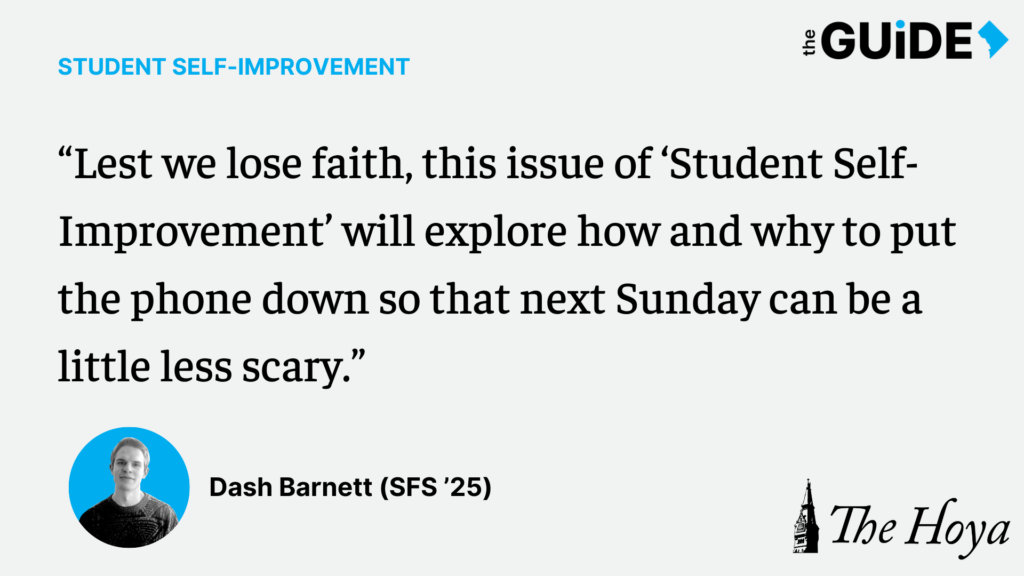For college students, every Sunday is a wake-up call. God did enough in six days to rest on the seventh, but many of us send off our weekends in Lauinger Library or the Leavey Center, atoning for Saturday’s somewhat intentional sins. iPhone users receive a special prize: the Apple Screen Time Report, in which a week’s worth of wasted time gets cataloged and compressed into one big number. Lest we lose faith, this issue of Student Self-Improvement will explore how and why to put the phone down so that next Sunday can be a little less scary.
In the name of journalistic values, I’ll put my cards on the table: four hours and five minutes, up 11% from last week for a total of 28 hours and 40 minutes of screen time. This seems like a crazy number, but studies suggest I’m doing better than most of you poor souls.
A 2014 Baylor University study pegged daily cell phone usage among college students at a whopping nine hours a day (although the survey respondents here were business students, who have more free time than most of us once they finish their coloring books for the day). That’s a full-time job’s worth of time down the drain! How do we live like this?
I also have to pile onto the same moral panic our parents have been selling for decades and point out that besides being a huge waste of time, excessive screen time is concretely and provably Bad For Your Health™. To pick some favorites from a 2018 literature review, your screen time symptoms may include — drumroll please — reduced bone density, depressive symptoms, suicidal thoughts, substance dependence behavior, ADHD-related behavior and my personal favorite: insulin resistance.
We can segue here into the separate but related moral panic around social media, which is correlated but not formally causally linked with recent, massive increases in youth mental health problems. A 2021 study about campus mental health after the introduction of Facebook asserted that the quantitative psychological damage done by the app was around one-fifth as bad as losing your job. But that was just Facebook, so we can estimate that being on TikTok is like getting divorced or shot, or even divorced and then shot — and maybe also stabbed afterward as kind of a coup de grâce. But at least you learned the renegade, right?
Chances are, if you’re reading this, you probably knew all that. The question I’m really asking is what you’re going to do about it. Phone addiction is incredibly, incredibly hard to beat, partially because it’s so culturally acceptable and partially because some of the smartest people in the world are in a room in Silicon Valley trying to keep us all hooked.
As someone who has been trying to stay on the wagon for a year or two, I think the key is quitting social media, which I’d bet makes up the biggest portion of your screen time. The first step towards quitting social media, I would argue, is to stop posting.
When you stop with the Snapchat stories, the Instagram posts and the TikToks, you force yourself to stop receiving validation from these sources and to stop communicating publicly in this way. You’re disabling two of social media’s best weapons against you, and you’re also taking yourself out of the imagined community of people who post on these platforms. You become something of an outsider, a lurker. A popular loner, even. Once your blinders are removed, things will feel a little weird as you begin to see the sorts of things people post on these platforms in a new light. Nature will begin to heal.
Your second step is deleting the social media apps altogether and only re-downloading them for specific instances. When I want to use Instagram to check my DMs or stalk someone or whatever, I manually re-download the app and delete it when I’m done (probably after I’ve watched a couple of dozen drunk-driving reels, but who’s counting). This method feels very silly, but it’s a form of effective moderation that’s more sustainable than going cold turkey. Over time, you’ll feel less and less tempted to return.
As I say in every column, however, this is just one method, and something else might work better for you. The point is that you only have a certain amount of time before you die, and it would be a crime to waste any more of it on TikTok.
Escaping the addiction that has defined our generation is not an easy task. Like anything worthwhile, it will take time and effort — but someday, you might wake up blissfully unaware of who said what to who or what the latest trend is. I believe that’s a future worth fighting for.
Dashiell Barnett is a sophomore in the School of Foreign Service. Student Self-Improvement will appear online and in print every three weeks.














